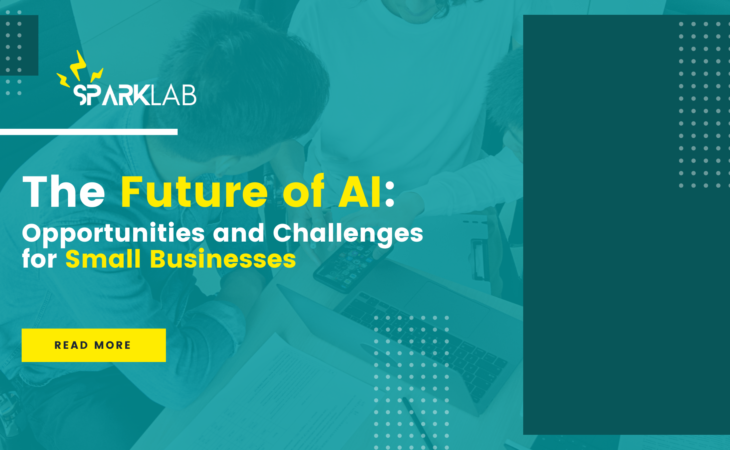
As we look into the future of AI and technological growth, it is clear that AI has enormous potential as a revolutionary force ready to redefine the landscape of small enterprises.
AI breakthroughs present a multitude of chances for small businesses to streamline their operations, change consumer experiences, and establish an invincible competitive edge with each passing day.
In this detailed post, we will go deep into the enthralling future of AI and examine the limitless opportunities and serious challenges that await small enterprises.
Artificial Intelligence offers some serious opportunities for small businesses as they can access tools that were previously either too expensive or very hard to access. And these tools bring about the following opportunities:
Small firms can use AI technologies to automate mundane and repetitive processes, freeing up crucial time and resources.
Businesses may expedite operations, enhance productivity, and eliminate human error by implementing AI-powered technologies.
AI can handle everything from customer service to inventory management, allowing small businesses to focus on strategic growth. A good example of this is SparkLab’s Intelligent Manager.
AI enables small businesses to use data to gain valuable insights and provide tailored experiences.
Businesses may gather, analyze, and understand massive amounts of data using advanced analytics and machine learning algorithms to uncover patterns, trends, and customer preferences.
This allows them to deliver tailored marketing efforts, customize product offerings, and improve customer satisfaction. SparkLab’s Dynamic Dashboard uses AI to provide unprecedented Data Analysis and Visualization abilities.
AI-powered chatbots and virtual assistants can help small firms provide round-the-clock customer service. Chatbots may answer simple questions, promote products, and even execute transactions.
Small businesses can boost customer engagement, reduce response times, and extend their support capabilities by adopting chatbot technology without incurring large overhead expenditures. Dynamic Survey from SparkLab is a prime example of this genre.
AI enables small firms to more accurately predict market trends, client behavior, and sales predictions.
Businesses may make informed judgments about inventory management, pricing tactics, and market positioning by leveraging historical data and machine learning algorithms.
This helps to reduce risks and improve business outcomes. SparkLab’s Customer Churn Predictor is made for the very purpose.
When it comes to AI technology, small firms frequently encounter financial limits. The initial expenditure necessary for AI implementation, which includes infrastructure, software, and personnel acquisition, can be substantial.
Overcoming these problems necessitates careful planning, cost-effective solutions, and collaboration with AI service providers.
As small firms acquire and analyze enormous amounts of client data, data privacy and security become increasingly important.
To secure sensitive information, AI systems must comply with data protection standards and adopt effective security measures.
To build customer trust, small businesses must prioritize data privacy and invest in secure infrastructure.
AI technology implementation necessitates particular knowledge and abilities. Small firms may have difficulty finding or affording AI professionals.
Businesses can address this issue by training existing personnel, collaborating with educational institutions, or partnering with AI consulting services.
Governments and industry groups can also help by boosting AI education and providing small business incentives.
Small firms must face the ethical and legal issues that AI technology raises. Important factors to take into mind include the bias of AI algorithms, the openness of decision-making, and responsibility for AI-driven acts.
To ensure compliance and protect their reputations, small enterprises must follow moral standards, create ethical AI practices, and keep up with changing legal requirements.
The rise of conversational AI platforms like ChatGPT is one of the astonishing developments in AI that is influencing the future of small businesses. The modern language model ChatGPT was created by OpenAI and is driven by the GPT-3.5 and GPT 4 architectures.
It has the potential to fundamentally alter how small businesses engage with their clients, automate procedures, and deliver individualized experiences.
Small businesses can use ChatGPT’s natural language processing capabilities to provide smooth and engaging customer support by integrating it into their workflows.
Numerous consumer inquiries can be handled using ChatGPT, which can also offer immediate assistance and make tailored product recommendations.
In addition to raising customer happiness, this lessens the workload for small business owners and workers, allowing them to concentrate on key responsibilities and long-term expansion.
ChatGPT can also act as a virtual assistant to help small firms automate certain parts of their operations. ChatGPT can dramatically increase productivity and efficiency in all areas, from scheduling activities and managing appointments to processing transactions and responding to simple questions.
Small firms can use ChatGPT to increase response times, streamline operations, and offer 24/7 assistance, increasing their overall competitiveness.
Additionally, ChatGPT’s flexibility enables small firms to gain insightful information from consumer interactions.
Small businesses may spot emerging trends, understand client preferences, and make data-driven decisions by analyzing the data collected from customer dialogues.
This gives them the ability to improve their goods, services, and marketing tactics, which eventually spurs growth and profitability.
So, when we talk about the future of AI, ChatGPT could take up a lot of important space in the conversation.

The future of AI is full of potentially positive surprises. Small businesses have a lot of chances to prosper and compete in a world that is becoming increasingly digital thanks to AI.
Small organizations may automate activities, personalize customer experiences, and acquire insightful information from data analysis by embracing AI technology, particularly conversational AI models like ChatGPT.
But there are challenges to overcome, including financial limitations, data protection concerns, hiring talent, and moral dilemmas. Small firms that thoughtfully incorporate AI into their processes will be well-positioned to take advantage of its benefits and ensure their long-term success in the business world.
Needless to say that small businesses have a bright future if they are willing to embrace the revolutionary power of AI and overcome obstacles by being persistent and adaptable.
Is your business also struggling to utilize AI for operations enhancements? Get in touch with our team here to get yourself the perfect AI solutions.